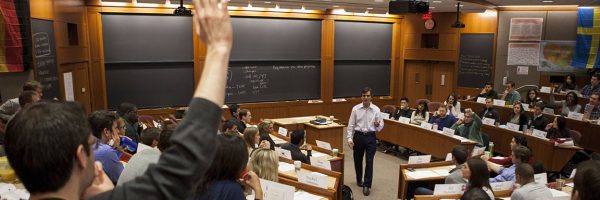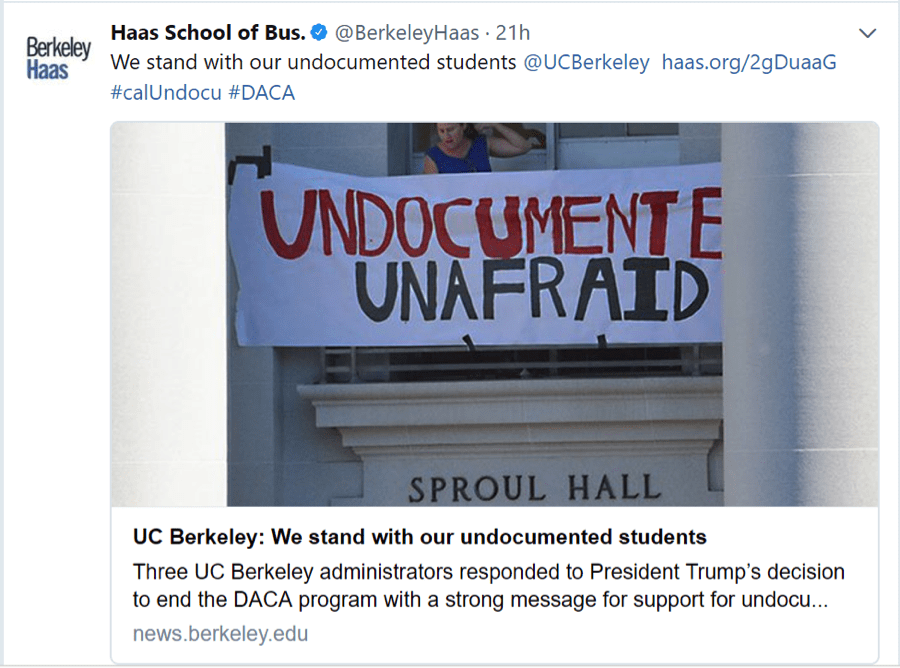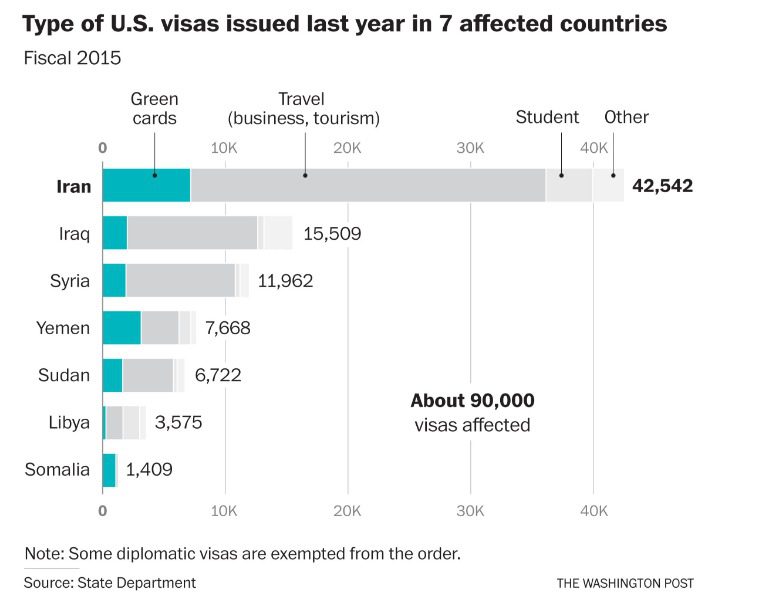More Harvard MBAs Are Turning to Politics

There’s no doubt that politics and public service have been hot topics since the November 2016 election. These subjects have dominated news stories and talk shows across the country. And, according to a recent report by the Wall Street Journal, politics and public service are also moving up as career choices for graduates from Harvard Business School (HBS).
Around 40 Class of ’17 HBS MBA graduates launched careers in government and nonprofits—twice as many as the previous year. Even though this represents just 4 percent of the program’s 900 graduates, it still suggests a growing interest in policy-making for business students.
Of course, business and government have always been closely connected, and it’s common for MBA students to aspire to public service and nonprofit involvement as part of their long-term career plans. The difference is that MBA graduates are starting to head into public service careers immediately after graduation. At least that’s what Matthew M. Segneri, an HBS MBA Class of 2004 alumnus, has witnessed.
Segneri, the director of the Social Enterprise Initiative at HBS, has noticed that graduates are increasingly considering careers in politics. In an article in the Harvard Crimson, he said: “Over the last 12 to 18 months, I’ve had a number of conversations with folks and seen a real uptick in the number of people who are thinking about local, state, and federal office.”
He went on to observe a change in the timing of these plans. “When you look at the prior generations of alumni there is more the tradition of learn, earn, and return—folks would go to school, have a successful traditional business career, and then later in life they would pursue public office or get deeply engaged in nonprofits and their communities,” Segneri said. “Today, there’s both an urgency and an understanding that it doesn’t have to be that way.”
There are many factors driving the surge in interest in politics. One is the simple fact that the United States elected a prominent businessman as president in the last election. Another is a trend of prominent business leaders being very vocal about politics in recent months, reinforcing the connection between the business and political realms.
For example, during the 2016 November election, Meg Whitman, the CEO of Hewlett Packard Enterprise Co., threw her support behind the Democratic candidate in New Jersey’s Fifth Congressional District race. And Carlos Diaz, a French entrepreneur in Silicon Valley, told the Financial Times that the tech industry has some responsibility for the 2016 election outcome.
YOU MAY ALSO LIKE: MBA Alumni Spotlight: HP CEO Meg Whitman
“The America that voted for Trump does not own a Tesla, nor an iPhone, and when it needs money, it does not ask business angels for help: it relies on bad credit,” Diaz said. “It is time to recognize that we need to develop technologies and businesses that will benefit the widest range of people possible, algorithms that do not divide but that bring together.”
So, it’s not a surprise that MBA graduates are heading into politics. In fact, more than a dozen Harvard MBA graduates have recently announced campaigns to run for local, state, or federal government.
Democrat Tim Keller, HBS MBA ’05, was elected mayor of Albuquerque, NM, last month while Republican Margaret Busse, HBS MBA ’01, recently announced her candidacy for the Massachusetts state senate. In addition, HBS MBA ’03 Sarah Amico is expected to announce her run for lieutenant governor in Georgia.
While Keller didn’t enter politics straight out of graduate business school, he understands why new MBA graduates are doing so. “In business school, what a lot of people do is say, ‘Oh, my second career is gonna be in public service. I’m gonna go into business, be successful, and then do public service,’” he told the Crimson. “What’s different all of a sudden is that people are opting out early, and they’re like ‘I’m gonna do this right now’ because they’re upset about something or fired up and want to make a difference.”
Adem T. Bunkeddeko, MBA Class of ’17, is currently running for Congress in New York’s Ninth Congressional District in Brooklyn—making him a perfect example of this phenomenon. Throughout his career at Harvard, Bunkeddeko maintained his connection to his local community and decided to use his business skills to better serve through politics. “At HBS we’re trained as general managers,” he said. “Understanding aspects of an organization, whether it be from the finance front or human capital, are important and useful skills that are actually quite lacking in public service today.”
And many other MBA graduates feel the same way. For Busse, who is running for the Massachusetts State Senate, the many case studies she read during her HBS coursework informed her desire to go into politics. “It’s really that ability to solve real-world problems that is needed in government today, that is needed in nonprofits today, and anywhere where people are trying to make a difference,” she said.
In addition, Busse sees widespread dissatisfaction with the current political climate as another reason MBA graduates are entering this arena. “I’m guessing a lot of people are feeling like me, frustrated with the current situation we have in politics today and feeling their skillset gives them a unique ability to help solve the problems we have right now,” Busse said.
In fact, that dissatisfaction led HBS MBA ’01 Daniella Ballou-Aares to recruit more HBS graduates into politics by forming the nonprofit Leadership Now with some of her fellow alumni. Developed after the 2016 election, Leadership Now recruits Harvard alumni and business leaders to run for office and helps to raise funds for their campaigns. After just a few months, the nonprofit already has the support of about 300 high-level business leaders.
Another example of HBS graduates encouraging public service is With Honor, which was developed by ’09 MBA Rye Barcott to support veterans running for office. In 2018, the organization plans to spend $30 million supporting campaigns for 25 to 35 congressional candidates.
In the end, Keller notes that the biggest motivation for MBAs to get into politics may be President Donald Trump. “Whether you like him or not, he is motivating. You’re either motivated against him or you’re motivated for him,” Keller said. “I also do think there’s just something about the millennial group that they’re not going to wait around.”
To learn more about how Harvard Business School facilitates students’ careers in politics, visit the school website.
This article has been edited and republished with permissions from our sister site, Clear Admit.
Business, University Leaders Speak Out Against DACA Repeal

When the Trump administration formally announced yesterday that it would end the Deferred Action for Childhood Arrivals program (DACA)—putting a six-month expiration date on legal protections granted to approximately 800,000 people who entered the U.S. illegally as children—universities and business leaders were quick to condemn it. Indeed, vocal defense of the “Dreamers,” as those in the DACA program are called, resounded from Silicon Valley to the Ivy League.
“Dreamers contribute to our companies and our communities just as much as you and I,” tweeted Tim Cook, CEO of Apple and an MBA graduate of Emory’s Goizueta Business School. “Apple will fight for them to be treated as equals.” In an earlier statement Cook noted that Apple employs hundreds of people covered by DACA.
Facebook CEO Mark Zuckerberg released his own statement on his personal Facebook page. “This is a sad day for our country,” he wrote. “The decision to end DACA is not just wrong. It is particularly cruel to offer young people the American Dream, encourage them to come out of the shadows and trust our government, and then punish them for it.” He added that the young people covered by DACA contribute to their communities and to the economy. “I’ve gotten to know some Dreamers over the past few years, and I’ve always been impressed by their strength and sense of purpose. They don’t deserve to live in fear.”
DACA was enacted in 2012 under former President Barack Obama by executive order, allowing individuals who were brought to the United States as children or teens before mid-2007 to apply for protection from deportation and work permits. To apply, they had to be younger than 31 at the time the program was created, have come to the U.S. before turning 16, and have lived in the U.S. for at least five years. The U.S. Citizenship and Immigration Services reports that roughly 788,000 have had their requests for DACA status accepted.
University and Business School Leaders Denounce DACA Repeal
A Center for American Progress survey of roughly 3,000 DACA recipients found that approximately 72 percent of respondents were in higher education, 13 percent of those pursuing master’s degrees. And leaders in higher education—including at several leading business schools—were every bit as vocal as major business leaders in calling out the Trump administration’s decision and pledging their support to Dreamers.
Geoffrey Garrett, dean of the University of Pennsylvania’s Wharton School, called the repeal of DACA “bad for the economy and bad for society” in a tweet that also expressed his support for an official statement issued earlier in the day by University of Pennsylvania President Amy Gutman.

Maryellen Reilly, Wharton Deputy Vice Dean for Admissions, financial aid and career management, quoted from Gutman’s statement in her own tweet: “At Penn, we are committed to providing a safe and welcoming environment for all of our students and we will do everything we can…”

Columbia University, home to Columbia Business School (CBS), issued its own statement in opposition to the repeal of DACA. “Columbia unequivocally opposes the ending of DACA and is working with others in higher education to urge Congress and federal officials to reinstate DACA’s protections and protect the rights of those with DACA status during and after the ‘wind-down’ process that has been announced,” it read. It went on to add that in keeping with Provost John Henry Coatsworth’s November pledge, “our policies and plans aim to ensure that students who had DACA coverage are able to proceed unimpeded with their studies and that all students in the community feel safe and understand beyond question that Columbia’s dedication to inclusion and diversity, including of undocumented students, is and will remain unwavering.” CBS quickly retweeted its parent university’s stance and linked to the full statement.
And the Haas School of Business at the University of California at Berkeley tweeted: “We stand with our undocumented students.” That tweet linked to a statement issued by three ranking university administrators—Chancellor Carol Christ, Vice Chancellor for Equity & Inclusion Oscar, and Undocumented Student Program Director Meng So—that called on the Berkeley community to stand with undocumented scholars at the university and beyond.

“At a time when our campus and community values are being challenged by the prevailing national rhetoric and policy making, we must deepen our resolve and commitment to our principles and to each other,” read the Berkeley administrators’ statement. “During these difficult moments, we must defend strongly held values of dignity, diversity and community.”
The Kelley School of Business at Indiana University at Bloomington, for its part, retweeted its parent university’s official statement and pledge to support all its students.

In the statement, IU President Michael A. McRobbie called out the decision to end DACA “especially in light of the administration’s prior statements expressing support for young people protected by DACA and the strong bipartisan support that exists nationwide for maintaining the program.”
McRobbie went on to underscore the university’s support of all its students. “We believe that all of our students, regardless of their background or country of origin, bring to our campuses unique perspectives and experiences that enrich our living and learning communities,” he wrote. “In doing so, they reflect who we are—and what we strive to be—as a university that provides all students with the opportunity to expand their knowledge and succeed in a place where they feel valued, respected and at home.”
In fact, IU features an entire website—DACA @ IU—dedicated to helping DACA students at the university. On the website, the university states that though bound by state and federal laws, it will take steps to support all IU students regardless of documentation and will only inquire into a person’s immigration status when required by law. IU also provides counseling and support to students who have immigration-related concerns, including connecting students with available resources for educational and living expenses.
Penn, Columbia, Berkeley, and IU are just a few of countless schools that spoke out against the Trump administration’s decision. Prior to the final decision to end DACA, 600 college and university presidents signed a statement promoting DACA back in November. Even more recently, Duke University’s President Vincent E. Price wrote a letter in support of the program, and University of Michigan President Mark Schlissel made a statement as part of the university’s September 1st convocation saying, “I would like to reiterate to all of our students, from our own state, elsewhere around the country, and from all around the world, that you are welcome here … You make us a stronger university and enrich our community and nation by your many talents, hard work, and the diverse perspectives and life experiences you bring to campus.”
As information continues to be provided by the Trump administration, many universities and schools are preparing to provide up-to-date information for their DACA students and all who are affected. Check in with your school for more information.
This article has been edited and republished with permissions from Clear Admit.
D’Amore-McKim Prof Talks Impact of Constant Change in White House

Following the recent and very abrupt exit of Communications Director Anthony Scaramucci, D’Amore-McKim School of Business Assistant Professor and leadership expert Parker Ellen spoke with News@Northeastern writer Molly Callahan about the “constant change on organizational culture” within the White House.
Point Loma University Writes Letter to POTUS About Immigration

In early February, Point Loma Nazarene University President Bob Brower wrote an open letter to President Trump and Vice President Pence. In the letter, President Brower, alongside Jon R. Wallace, President of Azusa Pacific University and Jim J. Adams, President of Life Pacific College, spoke about the recent immigration policies. They asked President Trump to “consider the pain that these restrictions cause for many innocent people.”
Trump Immigration Ban Stranding Business Students, Employees

On Friday, January 27, U.S. President Donald Trump signed his most prominent executive order of his early term; an effective Middle East immigration ban for at least 90 days.
The public outcry was defiantly swift and disruptive, with mass protests breaking out in airports across the country. In New York City, the New York Taxi Workers Alliance suspended all travel to JFK International Airport during the height of the protests, in which the United States effectively began turning away immigrants from Libya, Sudan, Somalia, Yemen, Syria, Iran and Iraq.
The implications are immeasurably vast. Prominent companies like Deloitte, McKinsey & Co. and Google—all of which hire many MBA graduates—have informed employees subjected to the terms of the ban, which also includes dual-citizens of the seven aforementioned countries, to cancel international travel plans for the time being.
Omid Scheybani, an MBA from the Stanford Graduate School of Business (GSB), spoke with Bloomberg after it became apparent he wouldn’t be leaving the country any time soon either. Scheybani, a dual-citizen of Germany and Iran, is stuck in California for now.
“I was invited to a wedding in Colombia, plans that I will probably cancel over the next few days,” he said in the interview. In March he was also planning a trip to Italy for first-year students. “It’s uncertain whether I will be able to attend, to lead this trip as well.”
Iran-born Khash Sajadi, also highlighted in the Bloomberg story, is the CEO of internet startup company Cloud 66. The 41-year-old works between London and San Francisco, but the ban has already warped plans to meet with clients stateside.
“That’s the problem we have now, we don’t know what to plan against,” he said. Sajadi hasn’t been to Iran in 11 years. His father, who lives in Iran, canceled a vacation to visit him and his two sisters, who also live in the U.S.
The Washington Post reports that around 90,000 people were directly affected from the immigration ban just between Friday and Sunday, January 29. This is in direct contrast from the White House, which claimed that 109 were affected. The 90,000 people, per the chart below, earned non-immigrant or immigrant visas according to the State Department in 2015. Visas, such as those for student, business and tourism purposes, only last for a finite period of time.

The chart above does include those who have dual-citizenship with any of the seven countries, which also numbers in the tens of thousands according to the State Department.
Of course, business students and employees aren’t the only ones included in those stark numbers. Students by-and-large are stranded across the country because of the immigration ban. And the implications of what is yet to come continues to flare the situation.
“If this could happen now—what does this mean if I were to be traveling for research or study abroad?” said Nate Mouttet, Seattle Pacific University Vice President For Enrollment Management. “Or if I am trying to come back into the country as someone who had a clear visa—will I be detained and not allowed back in?”
Stay tuned for more details as the situation continues to unfold.
George Washington Dean Discusses Women in Business at White House Event

Linda A. Livingstone, dean of the George Washington University School of Business, participated in a panel presentation hosted by the White House Council on Women and Girls and the Council of Economic Advisers. The panel, made up of leaders from the business and business school communities as well as other stakeholders, focused on opportunities for the business community and business schools to work together to adapt to the changing needs of the workforce by expanding opportunity for women in business.
According to a press release on the GWSB website, Livingstone joined representatives from more than 40 business schools in “committing to a set of best practices to build a business school experience that prepares women for the workforce of tomorrow.” Continue reading…
